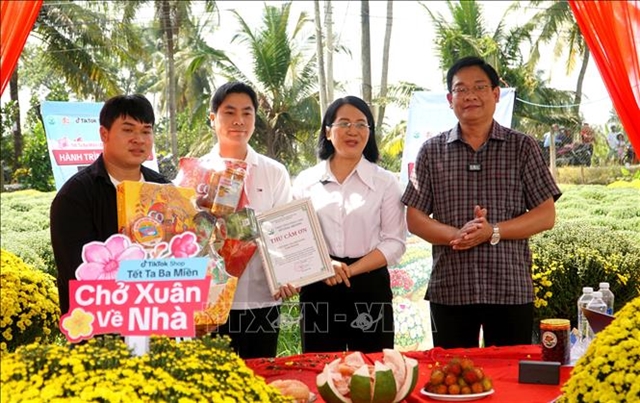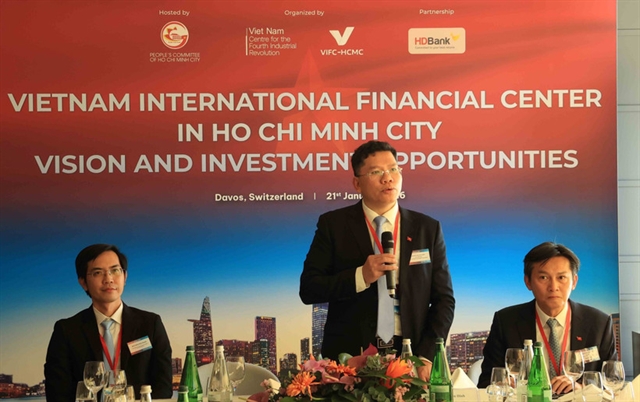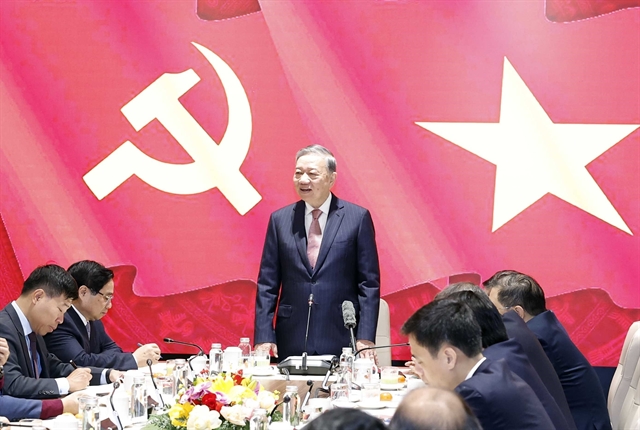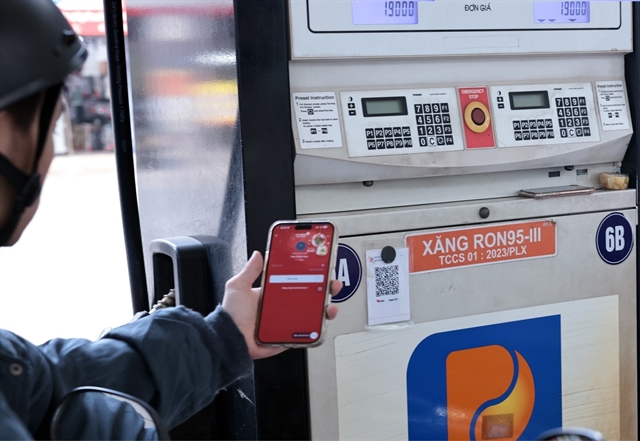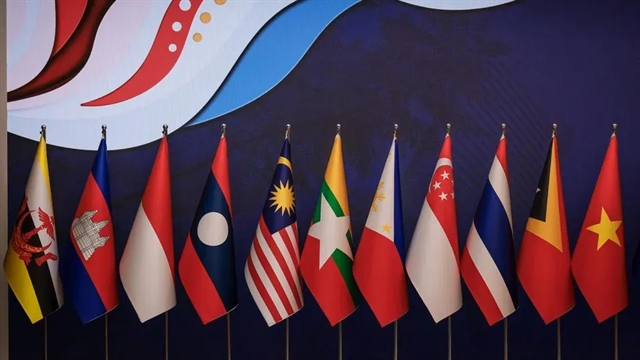 World
World

South Korean President Moon Jae-in and North Korean leader Kim Jong-un vowed sincere efforts to make progress at their bilateral summit Friday in the Joint Security Area of Panmunjom, which Moon said now symbolises peace, instead of division.
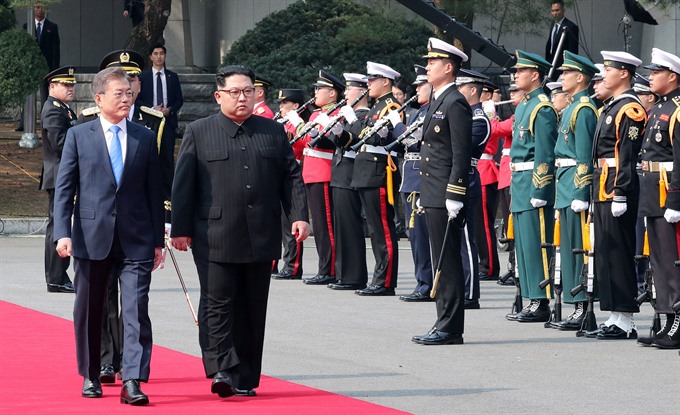 |
| North Korean leader Kim Jong-un (right), accompanied by South Korean President Moon Jae-in, inspects a South Korean honor guard prior to their talks at the truce village of Panmunjom on Friday. — YONHAP/VNA Photo |
ANMUNJOM/GOYANG, South Korea — South Korean President Moon Jae-in and North Korean leader Kim Jong-un vowed sincere efforts to make progress at their bilateral summit Friday in the Joint Security Area of Panmunjom, which Moon said now symbolises peace, instead of division.
The historic summit began after the leaders met for the first time at the Military Demarcation Line (MDL) inside the heavily fortified Demilitarised Zone.
"It is good to see you," Kim said to Moon, waiting just south of the MDL for their first-ever encounter that was quickly followed by a handshake.
"I cannot stop my excitement as we meet here at such a historical place. Also, it is very moving that you, Mr. President, have come to Panmunjom, the demarcation line, to greet me," the North Korean leader said.
Moon also sounded upbeat, saying they were facing a "historic moment."
Kim surprised many by inviting Moon to briefly cross the inter-Korean border to the North Korean side, which officials from Seoul’s presidential office Cheong Wa Dae later said was not prearranged.
The leaders’ official talks began at 10:15am, about 45 minutes after the North Korean leader crossed the MDL, becoming the first North Korean leader to do so at least since the end of the 1950-53 Korean War.
The talks ended shortly before noon after what Moon’s chief press secretary Yoon Young-chan described as very friendly and candid discussions.
The leaders jointly inspected a South Korean honour guard shortly after Kim crossed the inter-Korean border.
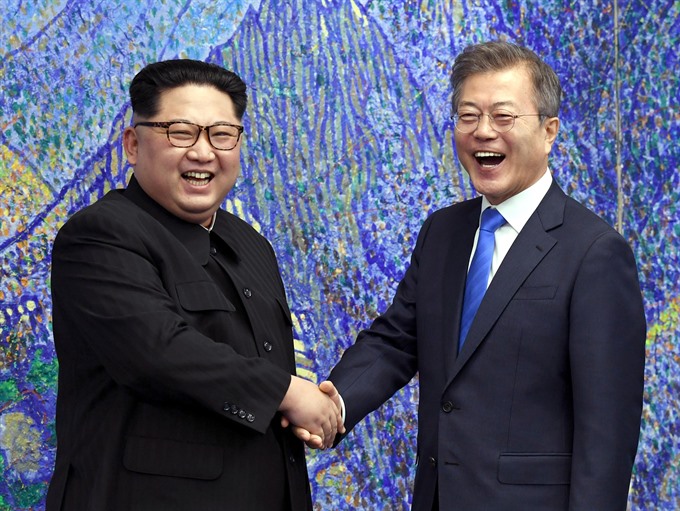 |
| South Korea’s President Moon Jae-in (right) shakes hands with North Korea’s leader Kim Jong Un (left) during the Inter-Korean summit. — AFP Photo |
Moon told Kim that the latter could have been given a much better and more grand ceremony had he visited Cheong Wa Dae in Seoul, according to Yoon.
Kim said he would visit Cheong Wa Dae at any time if Moon invited him, the Cheong Wa Dae official told a press briefing.
When the leaders opened their official talks at 10:15 am, about 15 minutes off their original schedule, Kim was the first to speak.
"I say this before President Moon and many journalists here that I will hold good discussions with President Moon with a frank, sincere and honest attitude and make a good outcome," he said at the start of the meeting, televised live.
Moon expressed his gratitude to Kim for agreeing to hold the summit.
"The moment Chairman Kim crossed the Military Demarcation Line, Panmunjom became a symbol of peace, not a symbol of division," he said, referring to Kim by his official title as the head of North Korea’s state affairs commission.
"I wish to again express my respect to Chairman Kim Jong-un’s decision that made today’s discussions possible," he added.
The Moon-Kim meeting came amid thawing ties this year that followed the height of tension between the divided Koreas, which technically remain at war as the 1950-53 Korean War ended with an armistice, not a peace treaty.
North Korea staged nearly a dozen missile tests since Moon took office in May 2017, while also conducting its sixth and most powerful nuclear test in September.
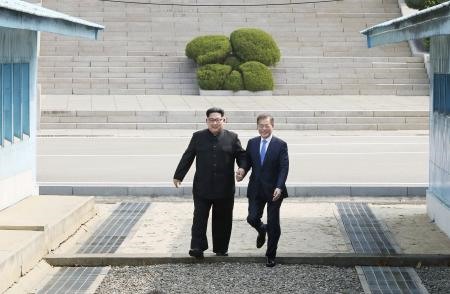 |
| North Korean leader Kim Jong Un (left) and South Korean President Moon Jae In cross the inter-Korean border hand-in-hand at the border village of Panmunjeom in the Demilitarised Zone on April 27. — KYODO |
Friday’s summit marked the third inter-Korean summit and the first to be held in South Korea.
Kim stressed the need for an agreement that will not collapse.
"I wish for it to be a chance for us to walk forward hand-in-hand while looking toward the future with a determination, instead of (summit) outcomes like those in the past that could not be implemented," he told Moon.
The two Koreas had agreed to denuclearise their countries and establish permanent peace on the Korean Peninsula in their two previous summits held in 2000 and 2007.
The agreements from the earlier inter-Korean summits have apparently collapsed.
"The world’s eyes and ears are directed toward this place, Panmunjom. The expectations of the people of both the South and the North, as well as our overseas citizens, are also very high," Moon said of the importance of progress at the meeting.
"I wish our talks too will be held frankly, so we can reach an agreement and create a great present for our people and everyone else in the world who wishes for peace," he added.
"I came to put an end to the history of confrontation and to resolve the issues that create problems in our relations together with the president," the North Korean leader was quoted as saying.
"I have come to have confidence that a good day will certainly come," he added, according to Yoon.
After the talks ended, Kim returned to his country where he will have lunch and rest before coming back to the South Korean side of Panmunjom for various events that include a friendship walk with the South Korean president.
The leaders will also jointly plant a tree to mark their summit, which Moon has said he wishes to hold regularly. The soil will come from Mount Paektu, on the North’s border with China, and Mount Halla, on the South’s southern island of Jeju.
It was not clear whether they will hold talks again in the afternoon before attending a welcome dinner set to be hosted by Moon.
It was just now confirmed that Kim’s wife Ri Sol-ju would attend the dinner.
The outcome of the summit was expected to be released later Friday.
The White House said in a statement it hoped the summit would "achieve progress toward a future of peace and prosperity for the entire Korean Peninsula".
Trump has demanded the North give up its weapons, and Washington is pressing for it to do so in a complete, verifiable and irreversible way.
But Seoul played down expectations Thursday, saying the North’s technological advances with its nuclear and missile programmes meant any deal would be "fundamentally different in nature from denuclearisation agreements in 1990s and early 2000s".
"That’s what makes this summit all the more difficult," the chief of the South’s presidential secretariat Im Jong-seok told reporters.
Peace and denuclearisation
Pyongyang is demanding as yet unspecified security guarantees to discuss its arsenal.
When Kim visited the North’s key backer Beijing last month in only his first foreign trip as leader, China’s official Xinhua news agency cited him saying that the issue could be resolved, as long as Seoul and Washington take "progressive and synchronous measures for the realisation of peace".
In the past, North Korean support for denuclearisation of the "Korean peninsula" has been code for the removal of US troops from the South and the end of its nuclear umbrella over its security ally -- prospects unthinkable in Washington.
"The big issues we know are peace and denuclearisation," Yonsei University professor John Delury said.
The two Koreas "can do a lot more on peace than on denuclearisation", he said, but the post-summit statement will give "a lot of chance to analyse every word, reading between the lines, look for things that are there and not there".
Pyongyang announced last week a moratorium on nuclear tests and intercontinental ballistic missiles, adding it would dismantle its Punggye-ri nuclear test site.
But it also said it had completed the development of its weapons and had no need for further tests. — YONHAP/AFP

